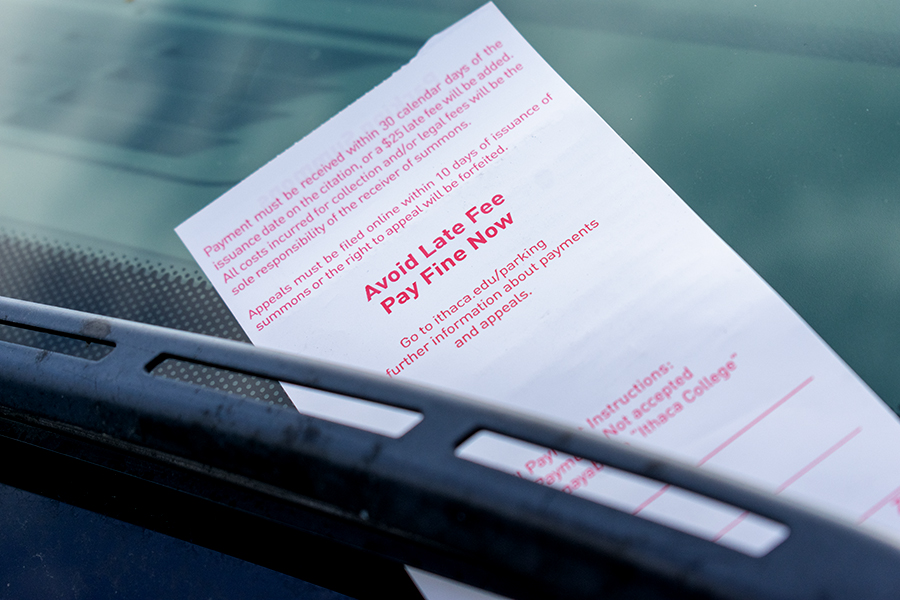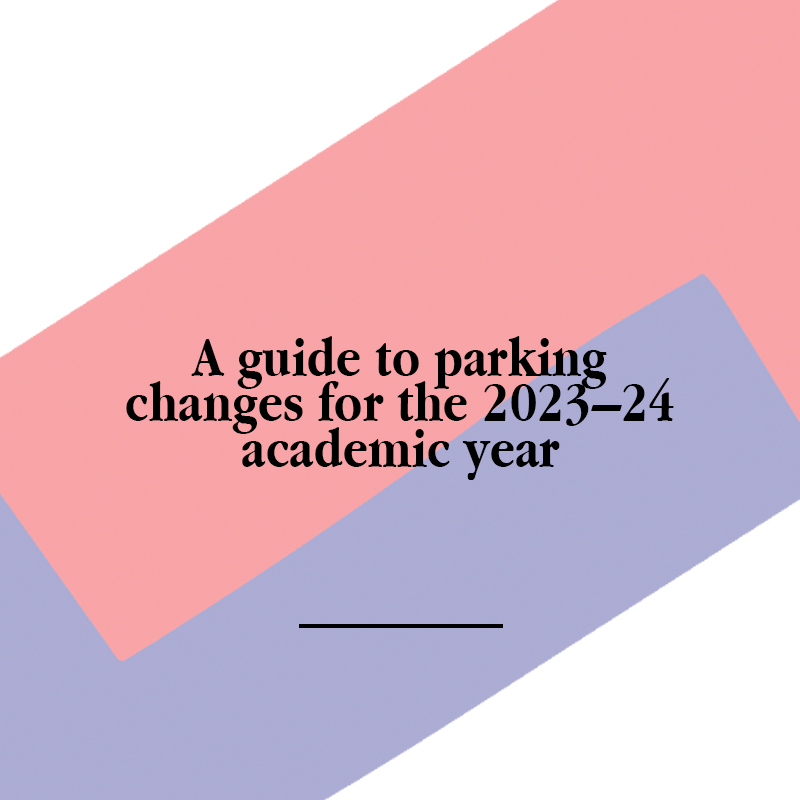Following a student-led petition created in Fall 2022, the Ithaca College Office of Parking and Traffic Services announced the enhancement of two new student parking zones.
The announcement was made on Aug. 18 via an Intercom post that stated parts of the O-lot and J-lot — located at the Roy H. Park School of Communications and Towers, respectively — that were previously meant for faculty and staff were converted into parking spots for students. In these areas, parking for faculty and staff is marked in blue and parking for students is marked in red.
This change comes after Khami Auerbach ’23 started a petition in Fall 2022 to fix inadequate parking on campus. The petition — which garnered 102 signatures at the time — asked for an expansion of red lot parking and the lowering of student permits and fines.
“If things stay the same, students will continue having to deal with walking extremely far or getting charged for parking, which again, is something we already paid hundreds for in the first place,” the petition stated.
Auerbach said that the lot change has resolved some of the issues raised in her petition and that she hopes this sets a trend for college administration.
“This is obviously a really good first step,” Auerbach said. “But I hope that the college takes these initiatives and other areas into account when in the future students have a very valid complaint and listen and take action to make the steps to fix things.”
Junior Mark Hooks lived in Towers in the 2022–23 academic year and was routinely disadvantaged by the lack of available parking. Hooks said he is not too optimistic about the change.
“I’ve had trouble finding a spot during night and day and before or after classes,” Hooks said. “Towers parking is atrocious and I’ve spent over an hour looking for a spot before. … This is a decent start, but the system is still far too broken to work effectively.”
According to Amy Shippos, parking services and transportation coordinator, roughly 70 spaces have been opened to students, with 50 spaces in O-Lot and 20 in J-Lot. Shippos said that despite the changes, faculty, staff and students seem to be happy with it. Staff and student parking on campus is split roughly down the middle, according to Shippos.
“There was some confusion at first [with] staff wanting to know where they could park,” Shippos said. “Changes happen and sometimes people have questions [about where they can park now], and we’ve pointed them in the right direction. Everybody seems to be settling in pretty comfortably.”
Zenon Wasyliw, professor in the Department of History, said he has not been affected by the changes but understands why those who are have reason to be upset.
“I always get here early in the morning and park at the Athletics and Events Center, so I haven’t been affected,” Wasyliw said.
Jack Bryant, associate professor and degree program director in the Department of Media Arts, Sciences and Studies, was affected by the parking changes. Bryant said he was frustrated about how the school handled the change with faculty and staff.
“I’ve been here for a number of years and parking has always been difficult for staff,” Bryant said. “It seems whenever there’s a need for overflow parking, it’s typically the faculty spaces that get used. … It’s frustrating when we’re told we have less spots to park and the advice is always to either carpool or park further away,” Bryant said.
Staff and faculty must fill out a form when they apply for a parking pass, but like students they are also limited. Wasyliw said the timing of when faculty arrive on campus also matters for getting their desired parking spots.
“For people who show up later and have to use Park, I get why there’s been some confusion and anger,” Wasyliw said.
The parking situation has long been an issue for the college’s students, with the price of parking permits reaching $500 for first-year students, $142 for upperclassmen and $90 for graduate students. Students also face $35-40 fines for parking violations. The limited permit system works on a first come, first serve basis, preventing many from being able to register for a pass.
A parking ticket at most colleges in New York State costs $20, while tickets at the college cost $30-40, according to the petition. Auerbach said she felt that the cost at the college was not justified given the parking circumstances at the time.
“Our parking is so spread out and not near any buildings,” Auerbach said. “They need to reduce the price of parking tickets because a parking ticket on campus is twice as expensive as one in town.”
Shippos said that parking lot changes are not simple and require an incredibly collaborative effort from different offices and departments at the college.
“A lot of times we have things that prevent us from doing the changes,” Shippos said. “Because when you’re making a parking lot change, you have to talk to all the key players on the campus in order to make the change. For instance, if the ground crew says it is not possible due to snow removal, we have to be in favor of that because a major part of our year is snow removal.”
Thomas Dunn, associate director and deputy chief in the Office of Public Safety and Emergency Management, said the office looks forward to feedback from stakeholders.
“I would offer that people could provide us feedback through our email if anyone has any other recommendations,” Dunn said. “We want to make sure that spaces are utilized and maximizing their utilization by everybody — students, staff, faculty, everybody.”
Shippos said students who are expecting more immediate changes will have to wait until at least Spring 2024.
“I would say this is it for now,” Shippos said. “We’re going to be monitoring but if there’s going to be any changes again, we typically plan it for a new academic year or the beginning of a semester.”








